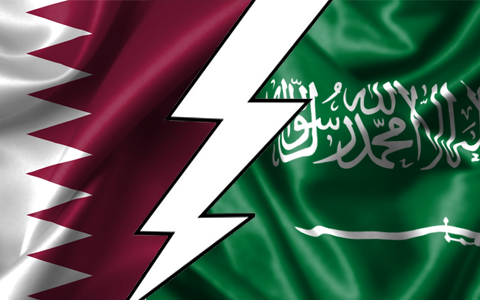 RIYADH: Saudi Arabia and its allies unveiled a "terrorist" blacklist yesterday of 18 organizations and individuals suspected of links with Islamist extremism that they said had ties with regional rival Qatar. The move by the four Arab governments came despite mounting international pressure to compromise in their weeks-old boycott of their fellow US ally. Saudi Arabia, the United Arab Emirates, Bahrain and Egypt last month released a list of 59 people and 12 groups they alleged had links to Qatar, accused by the four states of ties to extremist groups in the region. Qatar has denied the allegations.
RIYADH: Saudi Arabia and its allies unveiled a "terrorist" blacklist yesterday of 18 organizations and individuals suspected of links with Islamist extremism that they said had ties with regional rival Qatar. The move by the four Arab governments came despite mounting international pressure to compromise in their weeks-old boycott of their fellow US ally. Saudi Arabia, the United Arab Emirates, Bahrain and Egypt last month released a list of 59 people and 12 groups they alleged had links to Qatar, accused by the four states of ties to extremist groups in the region. Qatar has denied the allegations.
Yesterday's list blacklisted nine charity and media organizations and nine individuals "directly or indirectly linked to Qatari authorities" as "terrorist", read a joint statement released by the four states. "We expect Qatari authorities to take the next step and prosecute the terrorist groups and people," the statement said. "The four countries and their international partners will ensure that Qatar has ceased its support and funding of terrorism, has stopped welcoming terrorists and has stopped spreading extremist and hate speech," it added.
The Saudi-led bloc, which now blacklists 89 persons and organizations accused of ties to Islamist groups they say are backed by Qatar, also dismissed an amendment last week to Doha's counter-terrorism law as "insufficient". Saudi Arabia and its allies have been boycotting Qatar since June 5 in the region's worst diplomatic crisis in years. They sealed the emirate's only land border, ordered its citizens to leave and closed their airspace and waters to Qatari flights and shipping.
They demanded that Qatar break its longstanding ties with the Muslim Brotherhood, blacklisted as a "terror group" by the four governments although not by the international community. They also demanded that it close broadcasting giant Al-Jazeera and a Turkish military base, and fall in line with Saudi-led policy in the region, particularly towards Iran.
Qatar has dismissed the demands as a violation of its sovereignty and has received significant support from its ally Turkey. US Secretary of State Rex Tillerson, who last week spent four days in the region trying to broker a settlement of the crisis, has voiced satisfaction with Qatar's efforts to address any suspicion of terror funding.
The four governments yesterday blacklisted three organizations based in Yemen and six based in Libya accusing them of ties to Al-Qaeda. They also blacklisted three Qataris, three Yemenis, two Libyans and a Kuwaiti they said were implicated in "fundraising campaigns to support (former Al-Qaeda affiliate) Al-Nusra Front and other terrorist militias in Syria".
Qatar and its neighbors support opposing sides in the conflict in Libya between a UN-backed unity government in Tripoli and a rival administration in the east. Saudi Arabia has led a military intervention against Shiite rebels in neighboring Yemen since March 2015. Militants of both Al-Qaeda and the Islamic State group have since expanded their presence in areas of the south under the nominal control of the Saudi-backed government.
Meanwhile, Egypt's President Abdel Fattah Al-Sisi said on Monday his government would keep up the blockade of Qatar. "Egypt will stand by its decision and will not backtrack on this matter," Sisi said at a youth conference in Alexandria. "Our persistence on its own, our stance, and this block, is pressure in itself."
Egypt also warned the EU yesterday that four Arab states would accept no compromise in their dispute with Qatar. Foreign Minister Sameh Shoukry, speaking after talks with European Union diplomatic chief Federica Mogherini in Brussels, said Qatar must accept in full the demands. "It is not an issue of compromise, we cannot compromise with any form of terrorism, we cannot compromise or enter into any form of negotiations," Shoukry told a press conference.
"It is only once the necessary measures are undertaken by Qatar, that goes towards truly accepting to be a partner in the fight against terrorism, that this crisis will be resolved," he said. Shoukry said Qatar was "harboring elements associated to terrorist ideologies, to radical ideologies, that they have utilized their media outlets to promote and to justify and to glorify terrorist activity."
But the four Arab states face mounting international pressure to compromise in their weeks-old boycott against Qatar, particularly from the United States. Mogherini - who at the weekend met HH the Amir of Kuwait emir, a key figure involved in trying to mediate the crisis - in turn reiterated calls for talks to resolve the crisis. "We in Europe see this as a need not just for one country but for all countries," she said, adding that the EU shared with Egypt a "clear commitment to fight terrorism".
But she added that the EU believed the Kuwaiti-mediated talks "can and should start as a matter of urgency," if only to head off fresh tensions which undermine the fight against terrorism, she said. "The EU will continue to have good relations with all the countries involved," the former Italian foreign minister added. - Agencies










